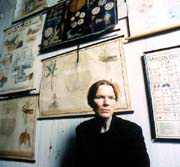He’s a well-known poet and was the frontman of the ’80s band that gave us the quirky hit song “People Who Died,” The Jim Carroll Band. But what Jim Carroll is probably most famous for are his diary entries written between the ages of 12 to 15, better known as The Basketball Diaries. The Basketball Diaries, a compilation of stories from his time at Trinity High School as an All-City Basketball star and a heroin addict from 1963 to 1966, was published in 1978 and made into the 1995 film starring Leonardo Di Caprio and Mark Wahlberg. The movie was directed by Scott Kalvert and was partially filmed in Hoboken.
Carroll, now off of heroin and very much into writing, has developed his career as an author with six books of poetry and two books of diaries and prose, and has been included in numerous poetry anthologies. In addition to publishing, Carroll does some touring every year to perform his poetry and prose pieces at spoken word shows. In fact, he’ll be coming to Hoboken this Saturday, March 10 at 7:30 p.m. to speak at Maxwell’s.
The funky floor at Maxwell’s
“Whenever I do a reading in a place like Boston, New York, Washington D.C. or places that I do every year or twice a year, I always have to have some kind of new prose, because I figure that there will be an overlap in the audience,” Carroll said last week. “I’ve read some sections of this new novel I’m working on, but it’s hard to take out a piece of it and get the whole story idea along with the writing. You might have to read 30 pages, and that’s too much. I mean, I don’t think people, even if they’re used to readings, have that much of an attention span.”
Carroll said that this will probably be true at Maxwell’s “because people stand up.” He added, “They don’t even sit on the floor. I don’t know why. I’m sure it’s funky, but I’ve read in funkier places where people have sat on the floor. I just noticed that one time when I was reading there.”
Carroll said that he never reads from the Basketball Diaries. “It’s hard for me to get the voice of it,” he said. “I haven’t read any of it at a reading in a long time. I should just bust it out one night.”
Spoken word and publishing
Carroll said that spoken word performances can be “tricky” because it’s easy to “fall on your ass.”
“Spoken word is much more emotional too,” he said. “If I have to do two sets of poetry in one night, that’s much more exhausting to me than doing two sets with a band. In a band, in the second set, you can just f*** around and come at the songs a lot looser and in a different direction musically, and those could be the best shows you’ve ever done. But you’re just drained after you do a reading. That’s how you know the energy is different. It doesn’t have as much as a sexual pulse to it, as much as an intellectual thing coming out you. Not to say that there’s no sexual aspect to a spoken word thing, because there is, but you’re not crawling on the stage tongue-kissing girls in the front row and stuff, although that might not be a bad idea.”
Carroll also talked about getting into the writing business.”
Carroll said that he remembers the struggles of trying to get published.
“When I was a young poet and with the people around the St. Mark’s scene, where I was kind of like the token prodigy I guess, you always sent your best poems to the Paris Review,” he said. “And everyone wanted to publish at least one poem in Poetry Magazine, which was the bastion of academic poetry, just to prove that they could get published in it. They took a long poem of mine the first time I sent one, and everyone was really pissed. But when you get published, you don’t want to have anything to do with the magazine again. You realize everything else in the magazine sucks, but you just want to prove that you can do it. I remember getting that over with pretty quickly.”
Mixed feelings on movie
Carroll said that he had mixed feelings about “Basketball Diaries,” the movie. In fact, he was sometimes at odds with the director.
“I thought the performances were good, but I just really had a problem with the direction,” he said. “The guy kept telling me how passionate he was to do it. I mean, he passed up so many other bigger projects and stuff, but he was basically a really hot MTV guy. I believed he had this passion, because I think he read it in college like in a time of his life when he was really coming into himself. I liked the screenplay on paper, but he totally f***ed it up by being so worried about shots. He wouldn’t make any changes, and I only had a few once we started shooting. I just saw ways that we could initiate certain aspects of the character, because you weren’t getting too much, except for seeing him scribbling in his notebook, about where he was going with his poetry, and I knew ways that we could do that. But this guy just didn’t get it. That was a night that I really had a real blow out with the guy, and Leo actually backed me up and left the set, but he just had a cr
